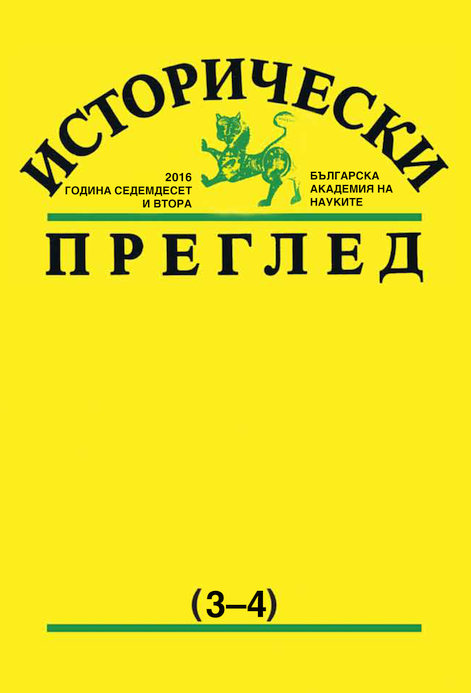„Нищо друго освен правото на покровителство ...“: робската интеграция в Oсманската империя в светлината на отношенията между господари и роби (по материали от Централните Балкани, средата на XVI – началото на XVIII век)
“Nothing but the right of patronage ...”: slave integration in the Ottoman Empire in the light of the relationship between masters and slaves (on materials of the Central Balkan from the middle of the 16th to the early 18th century)
Author(s): Olga TodorovaSubject(s): History, Cultural history, Political history, Social history, Modern Age, Special Historiographies:, 16th Century, 17th Century, 18th Century, The Ottoman Empire
Published by: Институт за исторически изследвания - Българска академия на науките
Keywords: domestic slaves; freed slaves; Ottoman Empire; Balkans; slave integration; patronage-clientelist relationships;
Summary/Abstract: The centre of this study is the topic of the melting in the Ottoman “cauldron” of those captive aliens who, after their enslavement, filled the ranks of the so-called domestic slaves. In the development of this issue, a more special approach was chosen, with emphasis not on the role of the Ottoman state as a regulator of integration-assimilation processes, but on the slave integration “from below”. The aim is to reveal those specific relationships and interactions between the two sides of the “master-slave” dyad which contributed most to the effective incorporation of the enslaved in the Ottoman society. Regarding the territories included, the study covers the Central Balkan region. It is based on diverse sources, including unpublished Ottoman documents from the Sijiles of the cities of Sofia, Russe and Vidin from the middle of the 16th to the beginning of the 18th century. In the course of her work, the author analyses, in a Central Balkan context, some well-known mechanisms for slave integration (such as Islamization, for example) and a number of others that have been either undeservedly underestimated or completely neglected in specialized studies such as: labour and linguistic integration, marriage, assimilation of the Ottoman style and way of living, creation of a network of contacts in the host society, etc. The socialization of slaves is outlined as a process not only gradual but also lengthy. Starting in the first days of the slave’s stay in Ottoman territory, this process continued to evolve with varying degrees of intensity, defined by a number of factors, including the formal legal status of each individual slave (e.g. mazun, mucatib, mudebber, „ordinary” slave, etc.) The process of socialization was far from ending neither with the Islamization of the slave nor with their emancipation. The article emphasizes the active participation of the slave-owner and his family in all stages of the slave socialization, especially in the post-emancipatory phase when, under Islamic law, the relationship between a former slave and a former master grew into a patron-client relationship. The practical dimensions of these patron-client relationships are revealed through several “case studies”, made on the basis of hereditary inventories of six freed women slaves, died in Sofia in the 1670s.
Journal: Исторически преглед
- Issue Year: 2016
- Issue No: 3-4
- Page Range: 22-88
- Page Count: 67
- Language: Bulgarian
- Content File-PDF

